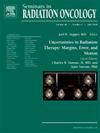Radiopharmaceuticals in Prostate Cancer: General Considerations and Utility in Combination With EBRT
IF 3.2
3区 医学
Q3 ONCOLOGY
引用次数: 0
Abstract
The management of prostate cancer has posed challenges for clinicians in determining optimal treatment strategies. Over the years, various radiopharmaceuticals have been utilized for both the diagnosis and treatment of the prostate cancer. Recent advancements in prostate specific membrane antigen (PSMA) based imaging have enabled the early and precise detection of local recurrence, lymph nodes or distant metastases, resulting a paradigm shift, which significantly influenced clinical decision making. Moreover, PSMA targeted treatments, as a part of theranostic approach, have introduced novel treatment options for patients with castration resistant metastatic prostate cancer, who were previously limited to palliative treatment alternatives. The clinical integration of PSMA based imaging and treatment has led to the commencement of collaborative studies across multiple disciplines including radiation oncology. Radiopharmaceuticals led by PSMA have the potential to facilitate accurate treatment decision making through earlier and more precise lesion detection, as well as improve patient outcomes when combined with radiotherapy. We aimed to review the role of radiopharmaceuticals in diagnosis and treatment of prostate cancer, focusing on their utility in guiding radiotherapy and the potential benefits of combining these radiopharmaceuticals with radiotherapy.
放射性药物治疗前列腺癌:与EBRT联合的一般考虑和效用
前列腺癌的治疗对临床医生提出了确定最佳治疗策略的挑战。多年来,各种放射性药物已被用于前列腺癌的诊断和治疗。基于前列腺特异性膜抗原(PSMA)成像技术的最新进展,使局部复发、淋巴结或远处转移的早期和精确检测成为可能,从而导致范式转变,这对临床决策产生了重大影响。此外,PSMA靶向治疗作为治疗方法的一部分,为去势抵抗性转移性前列腺癌患者提供了新的治疗选择,这些患者以前仅限于姑息治疗方案。基于PSMA的成像和治疗的临床整合导致了包括放射肿瘤学在内的多个学科的合作研究的开始。PSMA领导的放射性药物有可能通过更早、更精确的病变检测来促进准确的治疗决策,并在与放疗联合使用时改善患者的预后。本文旨在综述放射性药物在前列腺癌诊断和治疗中的作用,重点介绍放射性药物在指导放射治疗中的应用以及放射性药物与放射治疗联合使用的潜在益处。
本文章由计算机程序翻译,如有差异,请以英文原文为准。
求助全文
约1分钟内获得全文
求助全文
来源期刊
CiteScore
5.80
自引率
0.00%
发文量
48
审稿时长
>12 weeks
期刊介绍:
Each issue of Seminars in Radiation Oncology is compiled by a guest editor to address a specific topic in the specialty, presenting definitive information on areas of rapid change and development. A significant number of articles report new scientific information. Topics covered include tumor biology, diagnosis, medical and surgical management of the patient, and new technologies.

 求助内容:
求助内容: 应助结果提醒方式:
应助结果提醒方式:


